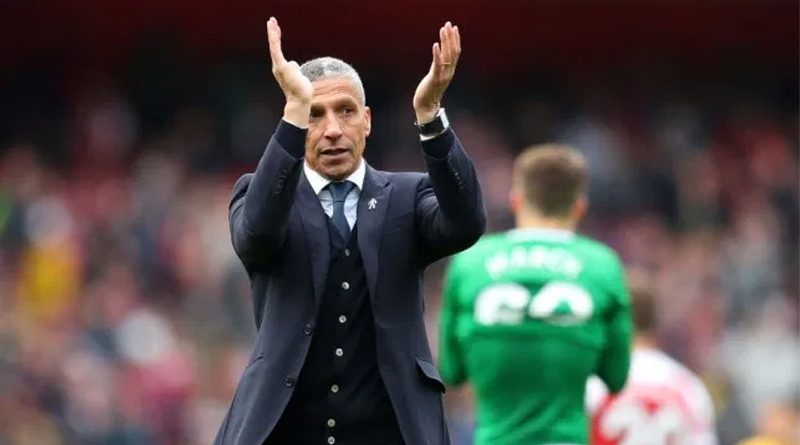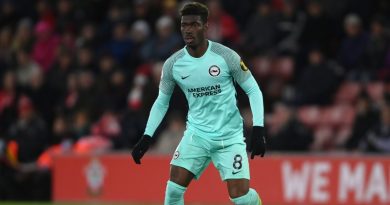Analysing Brighton’s sacking of Chris Hughton one year on
It was early on Monday 13th May 2019 when the news broke that Brighton & Hove Albion had taken the decision to sack Chris Hughton as their manager.
Most of the football world were shocked by Tony Bloom’s actions in firing a man who, from the outside looking in at least, seemed to have achieved everything asked of him.
Hughton had led Brighton from the Championship relegation zone to the Premier League. He had then kept the Albion in the top flight for two seasons running and delivered the added bonus of an unforgettable run to the semi finals of the FA Cup and a magnificent day out at Wembley.
But for those of us who had sat through the final five months of the Hughton era, there was perhaps a little less surprise. Brighton had won just two league games in 18 and were extremely fortunate to survive.
Hughton had insisted on playing his new 4-3-3 formation when it was obvious it wasn’t working. The changing room looked lost to him when Plucky Little Bournemouth inflicted a heaviest home defeat on Brighton since 1973 and Cardiff City then won 2-0 at the Amex three days later.
The football itself had turned from dull-yet-effective to downright boring. At times, you wanted to scratch your eyes out.
You could sense as the 2018-19 season moved from one disappointing performance to the next that change might be coming, but nobody expected it to be delivered as swiftly or brutally as it was.
When Chris Hughton received the sack, we said that you wouldn’t be able to pass judgement on whether Brighton had taken the right decision until a year later.
Well, here are. Something else that nobody could have known as Bloom was handing Hughton his P45 is that the 2019-20 season would be curtailed by a global pandemic.
In another world, we’d be sitting here with one Premier League game left to go and analysis would be easy. If Brighton had improved their points total from 36 and were placed higher than 17th in the table, then the decision to sack Hughton would have been justified.
There are still nine games remaining of the current season and nobody knows when – or even if – they will be played.
Given how tough Brighton’s fixture list is – Arsenal, Leicester City, Manchester United, Liverpool and Manchester City are still to come – there is every possibility that the Albion could slip from their current position of 15th and into the relegation zone should the campaign ever be completed.
Brighton are on 29 points. Where do they pick up the required eight to top Hughton’s total? It’s hard to know, especially given the dire form that we were in before the season was put on hold back in mid-March.
Still, we’re going to have a go at analysing the whole affair. One year on from the day that shocked football, if not Albion fans, were Brighton right to sack Chris Hughton?
The timing of Chris Hughton’s sacking
The timing of Hughton’s sacking has always rankled. The ticker tape barely been cleared off the Amex pitch from Manchester City’s trophy party when Hughton was meeting Bloom at the Albion’s training ground at Lancing, under the impression that they would be discussing plans for next season. Instead, Hughton left as an unemployed man.
Brighton have always insisted that nobody other than Bloom knew what was coming until that Monday morning. Which is funny, as we were sat in The Caxton after the City game on the Sunday afternoon when a Seagulls fan said that Oddschecker suddenly had Graham Potter as odds on favourite to be the next Brighton manager.
Either there are gamblers and bookmakers in Britain who, with stunning guesswork, not only predicted that the seventh longest serving manager in English football Chris Hughton was about to receive the sack, but also that Brighton were going to appoint the manager of a team who had just finished 10th in the Championship in his place. Or people other than Bloom did know what was coming and subsequently started placing bets on it.
It might not have been common knowledge that Hughton was about to be fired, but the strange movements of the betting market suggest it was at least known beyond Bloom’s mind.
If the decision had already been taken, then it might have been nice for the club to announce Hughton’s departure before the City game.
That way, the Amex could have given the greatest manager Brighton have ever had the send off and thank you he deserved. Of course, Hughton might not have wanted that. If he’d felt like he was being hung out to dry, he might have said no and cleared his desk before City came to town.
But not having the opportunity to say goodbye to Hughton – as we got with Bruno – remains one of the biggest regrets of the whole process.
Brighton’s style of football
One of the major criticisms of Hughton was his style of football. Supporters had become bored of grinding out 1-0 victories, the atmosphere at the Amex was dissipating with each passing home game and if you were brave enough to go away, you knew that you’d be lucky to see a shot on target, let alone a goal.
The decision to sack Chris Hughton has brought big change for Brighton in that regard. Under Graham Potter, players have the licence to attack and be brave.
At times, that has led to some excellent football. When the Albion went to Watford on the opening day of the campaign, they tore apart a side who just three months earlier were celebrating their highest league finish since the 1980s and had reached the FA Cup Final.
Tottenham Hotspur had been Champions League finalists in June. In October, they were hammered 3-0 at the Amex. Admittedly, Spurs seemed a shadow of their former self on that day and within a matter of weeks, Mauricio Pochetinno had been sacked. But to play a world class team off the park in such a manner was something we had never seen Brighton do.
There’s no doubt that Hughton’s sacking has led to an improved style of football. Is that enough to deem the decision a success though? Not on its own.
Brighton’s tactics
Watching Hughton pick the same players and same formation every week in the second half of last season became something of a soul destroying experience.
From the moment that the Albion threw away a 2-0 lead to lose 4-2 in the snow at Fulham as January came to a close, it became obvious that Hughton’s decision to move to 4-3-3 wasn’t working. Even Stevie Wonder could see it.
And yet Hughton persevered until the end of the April with the new formation. Either he was blind to the problems it was causing – exposed full backs, Dale Stephens not suited as a single holding player, Pascal Gross’ effectiveness blunted by not being in the number 10 role, no options good enough to play as the two wide strikers alongside Glenn Murray – or he was too stubborn to return to 4-4-1-1.
Two wins in 18 famously followed. When Hughton did finally abandon 4-3-3, it was for a fan-appeasing 4-4-2 against Newcastle United. That was even more of a disaster and came across as a desperate move, especially when Gross was the shoehorned in as a right winger.
Florin Andone was lucky to receive only a yellow card rather than a red within 30 minutes of kick off (sound familiar?) and Hughton hauled him at half time, finally switching back to 4-4-1-1.
That first half against Newcastle was arguably the worst 45 minutes of the season and a warning that Hughton was running out of ideas. When a manager begins making erratic decisions like using a formation that hasn’t been seen for two years, it’s normally a sign he is coming to the end of his tenure.
Potter in contrast has received a lot of praise for his tactics. In the first few months of the campaign, his willingness to change formations and personnel was a breath of fresh air.
Not many sides could cope with his 3-4-3 at the start of the season and then a 4-2-2-2 with Gross and Aaron Mooy deployed as two number 10s baffled most opposition managers, including Pochettino.
With Hughton, you knew that he wouldn’t change anything until at least 70 minutes had elapsed unless something was going seriously awry. Potter meanwhile has made substitutions here, there and everywhere.
This isn’t necessarily a good thing however. Potter receives praise for making game changing subs – throwing on Solly March and Ezequiel Schelotto away at West Ham United being the best example – but often these are because he hasn’t got his tactics right from the start.
The Hammers are known for being weak out wide, so why begin the game with no width? Half the time, these bold substitutions that Potter makes are him rectifying the mistakes he made with his starting line up.
It’s good that he recognises where he’s gone wrong and is willing to make changes, but wouldn’t it be better if the team he picked from the start was the right one?
There have been further baffling decisions from Potter. Going to Manchester United and playing a high press with a high defensive line against an attack with the pace of Marcus Rashford and Anthony Martial was suicidal.
Tossing crosses into the box for Neal Maupay and Aaron Connolly when losing 3-1 at Bournemouth while Murray sat on the bench was bizarre.
And as for the Aston Villa home game, is it really sensible when defending a 1-0 lead with 20 minutes to go against a relegation rival to haul your centre forward (Connolly) and spark a positional merry-go-round of Mooy moving central, Steve Alzate shifting into midfield and Martin Montoya coming on at right back?
Especially when Alzate had kept Jack Grealish largely quiet. Within seven minutes of Potter’s tinkering, Grealish scored an equaliser. Sometimes, it has felt like Potter is trying to be too clever. Perhaps we should put that down to naivety. Potter is only in his second season as a professional manager in England.
Hughton’s sacking has certainly made the Albion more flexible tactically – but have we now gone too far the other way?
Promoting Young Players
Bloom has invested a significant amount of money into Brighton’s academy. Under Chris Hughton, it never really looked like Brighton would get a return on that investment, another factor which played a part in his sacking.
In his four-and-a-half years in charge, Hughton gave academy graduates just 18 minutes of league football. Rob Hunt played 17 of those at right back away at Burton Albion in 2016 after Bruno was injured and James Tilley got the other 60 seconds in the 2014-15 end-of-season dead rubber at Middlesbrough.
Hughton had a real reluctance to place his faith in youth. His sacking has cleared the way for Steve Alzate and Aaron Connolly to both become first team regulars and full internationals.
With more talent lurking either in the Albion system or out on loan, the future does look bright in terms of home grown players coming through – all of whom look likely to receive greater opportunities than they would if Hughton was still at the helm.
Ben White and Jayson Molumby will be next in line following their impressive Championship seasons with The Leeds United and Millwall respectively.
Below them lie the likes of Haydon Roberts, Teddy Jenks and Carl Rushworth, the young goalkeeper who has reportedly piqued the interest of Barcelona.
Results and Bloom’s Top 10 Plan
Ultimately, football is a results based business. For Brighton, those results need to be pushing towards the club towards the Premier League’s top 10, as decreed by Bloom in his ambitious plan which was publicly revealed at the start of the season.
Early Brighton results vindicated the decision to sack Chris Hughton. The Watford and Spurs victories were stunning and without VAR (West Ham at home) and brain dead first half red cards (Southampton at home, Aston Villa away), the Albion could have been riding as high as fifth in the Premier League when autumn rolled around.
Some of us were dreaming of the top eight and maybe even Europe. It seems stupid now, and proof that you should never get too carried away too early.
Still, the reaction of supporters was nothing compared to that of the club, who slapped themselves on the back for a job well done by awarding Potter a new six year contract after he’d won four games as a top flight manager.
Since the ink dried on that deal, Brighton have subsequently won just two of their past 19 in all competitions. A reminder that Hughton lost his job following a run of two wins in 18 league games.
Over the course of the 2019-20 season so far, results haven’t improved. Look at those nine remaining fixtures and it is hard to see where many – if any – further wins are going to come from.
Judge the decision to sack Hughton purely on games won and points achieved, and it hasn’t actually made much difference at all.
Were Brighton right to sack Chris Hughton?
Hughton achieved so much during his time as Brighton boss that it will always be a period in the Albion’s history that people look back at with misty eyes.
Not only that, but he was a thoroughly decent bloke. He understood the city, he spoke well and he was the ultimate professional. They don’t make many football managers like him anymore.
But the second half of the 2018-19 season was as bad as anything many of us can remember. Two wins in 18 matches would cost most managers their jobs; throw in defeats to relegated sides Fulham and Cardiff and the failure to beat Watford, Burnley, Bournemouth and Newcastle at home and you had a manager who was skating on thin ice.
The 5-0 defeat to Bournemouth was the turning point. Bloom would have seen at least 15,000 empty seats with 10 minutes still to play and heard the laughter and sarcasm from the terraces.
It’s when football fans move from anger to sarcasm that you know something needs to change. Mark McGhee was a dead man walking from the moment that the Withdean South Stand began celebrating Stoke City’s third, fourth and fifth goals in the final game of the 2005-06 season.
The performances in those final 18 games of the 2018-19 season, the tactical blunders, the players appearing to down tools after approaching Hughton asking to play a more attacking style – all of that points to the fact that had Hughton remained in charge for 2019-20, Brighton would have been relegated.
For that reason alone, Bloom made the right decision to sack Chris Hughton as Brighton boss. The question really should be did Bloom get it right by appointing Graham Potter as his successor? On that, the jury is still very much out.




